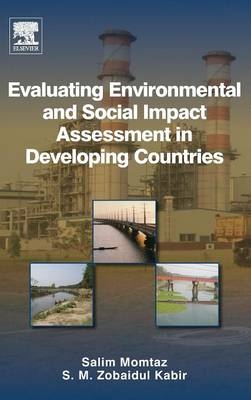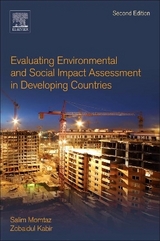
Evaluating Environmental and Social Impact Assessment in Developing Countries
Elsevier Science Publishing Co Inc (Verlag)
978-0-12-408129-1 (ISBN)
- Titel erscheint in neuer Auflage
- Artikel merken
Evaluating Environmental and Social Impact Assessment in Developing Countries is a valuable reference book for practitioners and researchers conducting research in and developing studies on environmental science and management and environmental and social impact assessment. The book’s authors have developed and tested a new framework to evaluate environmental impact assessment (EIA) systems that may be adopted by most developing countries with EIA experience. Application of this framework will help determine if the EIA is achieving its intended goal of sustainable development in these countries. It also explains the reasons behind the strengths and weaknesses from which the development practitioners and international development partners can take lessons. This book will help the reader answer such questions as "What are the best forms of public participation?" and "How do we measure contributions to EIA procedure?" since it is based on direct experiences from a developing country that is struggling with many of these issues. Evaluating Environmental and Social Impact Assessment in Developing Countries provides further understanding of appropriate tools to evaluate environmental and social impacts of development initiatives especially in developing countries.
Dr. Salim Momtaz is an Associate Professor, School of Environmental and Life Sciences at the University of Newcastle, Australia. He teaches in the area of Sustainable Resource Management. He received his BSc and MSc degrees in Geography from the University of Dhaka, Bangladesh. He obtained a PhD in Sustainable Development from the University of London under a Commonwealth Scholarship. Salim migrated to Australia in 1994. From 1995 to 1998 he taught Geography at Central Queensland University, Australia. He joined the University of Newcastle in 1999 where he has been teaching since. He had a stint in the US as a Visiting Professor at Georgetown University, Washington DC. He received Rotary International Ambassadorial Fellowship to teach and conduct research in Bangladesh. Salim’s current research interests include climate change adaptation, environmental governance and social impact assessment. Salim led the team that conducted one of the first social impact assessment studies in Australia ‘Independent Social Impact Assessment, RSERC, Rockhampton, 1998’. Salim published six books and many articles in international journals. He was a member of the Scientific Advisory Committee, Netherlands Government Research Organization, between 2007 and 2010 and is currently on the panel of international reviewers with the Swiss National Science Foundation. Dr. S.M. Zobaidul Kabir is currently working at the Centre for Environmental Management (CEM), CQUniversity, Australia, as a Postdoctoral Research Fellow in the area of environmental and social impact assessment. In addition to research, he teaches social and economic impact assessment at CQUniversity under Environmental Management program. Recently, he has obtained Doctor of Philosophy on Sustainable Resource Management from the University of Newcastle, Australia, under the prestigious Endeavour Postgraduate Award. Earlier, he obtained Master of Environmental Management and Master of Diplomacy from the Australian National University under AusAID scholarship.Dr. Kabir has more than 7 years of research experience in the area of ex-post evaluation of environmental performance of development projects, environmental policy analysis, environmental and social impact assessment of development projects, and social appraisal of mine closure plan. He worked for the Government of Bangladesh as a civil servant and held various positions. He also worked for the United Nations Population Fund (UNFPA), Bangladesh, as a National Project Professional Personnel (NPPP).He has more than 12 publications as scholarly journal articles and peer-reviewed conference proceedings. His research interests include impact assessment, greening business, community engagement, liveability assessment, environmental governance and sustainability assessment. He is a member of International Association of Impact Assessment (IAIA) and Environmental Institute of Australia and New Zealand.
Chapter 1: Introduction
Chapter 2: Evaluating the effectiveness of environmental impact assessment system in developing countries: the need for an integrated holistic approach
Chapter 3: Institutional framework of the environmental impact assessment system
Chapter 4: The quality of environmental impact statements
Chapter 5: Evaluating social impact assessment
Chapter 6: Evaluating community participation in environmental impact assessment
Chapter 7 Implementation of mitigation measures: EIA practice at post-EIS stage
Chapter 8: Evaluating environmental and social impact assessment: framework for effective EIA system
Glossary
| Sprache | englisch |
|---|---|
| Maße | 152 x 229 mm |
| Gewicht | 440 g |
| Themenwelt | Naturwissenschaften ► Biologie ► Ökologie / Naturschutz |
| Naturwissenschaften ► Geowissenschaften | |
| ISBN-10 | 0-12-408129-0 / 0124081290 |
| ISBN-13 | 978-0-12-408129-1 / 9780124081291 |
| Zustand | Neuware |
| Haben Sie eine Frage zum Produkt? |
aus dem Bereich



